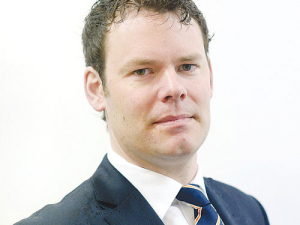Farmers’ fears about the outcome of the election and a new-look government have led to a slight drop in overall confidence in the latest Rabobank farmer confidence survey.
The survey completed earlier this month shows net farmer confidence has fallen to +38%, down from the record high of +54% in June.
Rabobank analyst Blake Holgate told Rural News the reason for the drop is falling commodity prices and fears about a future government’s policies. He says in the lead-up to the election farmers were concerned about its outcome and how this might play out in changes to government policies.
“We saw a significant spike in the last quarterly result in relation to that question and I think that’s aligned to polices relating to farming and potential intervention at the farmgate.”
“Farmers were concerned pre-election how this could impact farming generally. Now, as we are in coalition talks and the formation of a new government, [their concern is] with the kinds of intervention and regulation they may be facing in the next 12 months,” he says.
Holgate says farmers are concerned about how new or changed policies could affect their production costs and this has created uncertainty for their businesses. Environmental issues brought to the fore by various groups are the major concern.
“Environmental groups, in particular, have highlighted some of the different impacts of the farming sector. As we came up to the election, that translated into political parties taking a stand and articulating policies relating to those environmental areas which impact on farmers,” he adds.
“Interestingly, it’s the sheep and beef farmers, rather than dairy farmers, who showed a greater concern about government intervention and the potential impact of government policies in the last quarter,” he says.
Holgate believes this is because dairy farmers have been more aware of the issues and only now are sheep and beef farmers starting to realise they will get caught up in such policies sooner rather than later. Whether this lower confidence persists may depend on who forms the next government.
“If it was to be a National/NZ First government the indication is that the polices in the rural space will largely continue in the direction they have done in the past and I’d expect some of that uncertainty to erode,” he says.
“But if there is a change of government and an indication that policies may change, this could prolong this uncertainty.”
Holgate says any uncertainty could likely have an impact on farmer spending and investment. However, he points out that while there has been a drop in confidence in the past quarter, overall farmer’s confidence is still high.



















